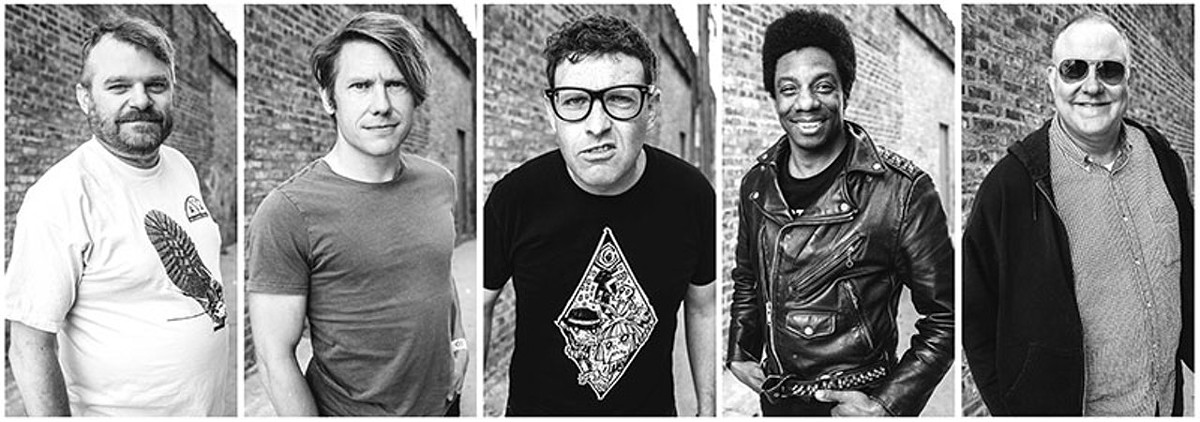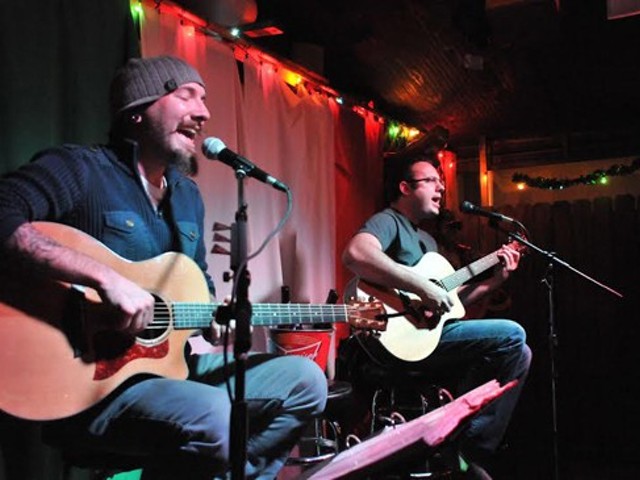As drummer Ted Moll remembers it, when St. Louis band MU330 was at the height of its traveling life, trombone player Gerry Lundquist was in charge of making the mixtapes — he'd put together a fresh set of fifteen or so every time the band headed out of town. Even with that many, a two-month tour meant that those cassettes got plenty of play, the songs burning into the memory banks of all who were in that van, creating a shared vocabulary in the process.
"Now that we're back on the road," Moll says, "we almost have our own language, an MU330 band-speak. It's a combination of the different media we were listening to. Gerry's tapes were a mix of subversive country from the '50s, surf, punk — just lots of weird stuff. There were so many favorite lyrics that we just ended up picking up. When we're relating to each other, speaking to each other, a lot of times it's through lines from different songs. It all has its own meaning to us and it's a language that relates to just us. If someone listens in, they'd have no idea what we're talking about."
What's most notable, of course, is that MU330 is back in the game at all, after a stretch of inaction that Moll figures lasted "about two to three years — probably the longest we'd ever gone without playing together." But now, after a rush of activity at the end of 2015 and into 2016, the band (Moll, Lundquist, his fellow trombone player Rob Bell, bassist Chris Diebold and guitarist/vocalist Dan Potthast) is back, albeit taking on a much less ambitious schedule than in the days when it was a touring machine.
This year, the long-running group has gone out on the road with old friends — first came some dates with Mustard Plug, then a trio with Streetlight Manifesto. From June 15 to 19, the band is heading to the Bay Area for a few sold-out shows in support of the twentieth anniversary of its label, Asian Man Records. And then there's talk of at least a show or two in St. Louis and Chicago this fall, again tied to anniversaries.
While not parsing out specifics, Moll says, "There were definitely some dark periods where people were going through some issues. It got to the point where some of us didn't want to deal with it anymore. And we didn't play for some time.
"But, for whatever reason, it worked out," he continues. "Whether it was tenacity or understanding or patience or lack of wanting to give it up. I'm sure we were like every band, especially one where there are some big personalities. Definitely there were times where it was a possibility, a real possibility, that we wouldn't play again. But the fact that we're where we are today and still friends and relatively healthy people is amazing."
Though the ska-punk band is not closed to the idea of new music emerging, for now its members have been focusing on making fans happy with the sets that they were playing when their last album, Ultra Panic, was new in stores in 2002. So far, they say, so good.
"I'm kind of in shock," says Bell, who stays active in the local scene with Suzie Cue and the Wackness. "I'd thought people had forgotten about us. I feel humbled and amazed at how the crowds have appeared and that they still dig us. It makes me want to play more."
Everything in this round of touring has come organically, Moll says.
"We were offered sets by our friends in Mustard Plug," he remembers. "There'd be a couple of shows, and we wanted to play them. But Gerry's health had been a problem for a couple of years. And opening shows is a nice, safe way to test the waters. You can play 30 minutes and see if it's something you can do. We didn't want to have an official St. Louis show at first for that very reason, 'cause you're committing to an hour or a 75-minute show. And if Gerry couldn't do it, we didn't want to make the commitment.
"But it worked," he continues. "Gerry's so strong. He did great, powered through the whole thing. Our secret show in December was a no-pressure gig, without any real obligation other than to do a few songs and see if we could pull it off."
That unannounced (but hotly rumored) show took place at a packed Foam, where Potthast was scheduled as a solo act. With word of special plans getting out late, Potthast played some songs, then the band joined for some more. It was a fun homecoming that neatly showed the strength of the ties that still bind the five players.
Potthast, long since relocated to Santa Cruz, California, has been touring solo, with a band (the Bricks) and as side player in recent times. Within the past year, the amiable songwriter has toured the U.S. and Australia; the fact he's just played dates in Tasmania, Moll says, "is pretty amazing." The remaining members of the group have wildly differing musical lives, but all four of them still live in St. Louis.
Because of their unusual arrangement, the band's kicked into a more serious practice schedule of late, even without Potthast on hand.
"Lately, we've been rehearsing every weekend" before shows, Moll says. "We were really well-rehearsed for that last set of shows. In the past, doing one or two shows a year, we had the muscle memory — but it's a matter of getting those muscles back in shape. Especially Chris. I don't know how he does it; he has to play so fast."
Bell agrees that the energy the group puts into shows (now an energy being exerted some twenty years after those "psycho ska" songs were written) is a challenge.
"MU330 is the hardest band I've ever played in," he says. "Having to play those songs is quite challenging. Not once, when I'm playing these, does it seem easy."
Discussing the band's early days as an opener, Moll suggests that the group has come full circle. In those days they were out to win a crowd over — one there to see the headliner. In opening for Streetlight Manifesto, a group with a hardcore, cult-like following, they again had to win over folks who have never seen them, including a lot of younger fans who struggled to wrap their heads around the fact that the group started gigging in 1989. It was sort of like those old days, blasting mixtapes in the van on the way from town to town.
"That was cool, going back in time and being on tour, selling yourself," Moll says. "It was like being on tour with the Toasters that first time. Playing to these ska fans, who were only there for the Toasters. It was similar, but this time we're not trying to find our musical voice. At this point, we're bringing the complete package."






